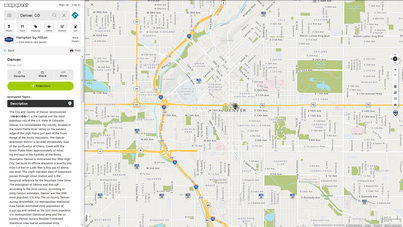The Evolution of Digital Navigation: Exploring the Legacy of MapQuest
Related Articles: The Evolution of Digital Navigation: Exploring the Legacy of MapQuest
Introduction
In this auspicious occasion, we are delighted to delve into the intriguing topic related to The Evolution of Digital Navigation: Exploring the Legacy of MapQuest. Let’s weave interesting information and offer fresh perspectives to the readers.
Table of Content
The Evolution of Digital Navigation: Exploring the Legacy of MapQuest
The advent of the internet in the late 20th century ushered in a new era of information access and communication. One of the most transformative applications of this technology was the emergence of online mapping services. Among the pioneers in this field was MapQuest, a platform that revolutionized the way individuals navigated the physical world. This article delves into the history, evolution, and lasting impact of MapQuest, examining its significance in the development of digital navigation and its enduring influence on contemporary mapping technologies.
The Genesis of MapQuest: A Technological Revolution
MapQuest emerged in 1996 as a subsidiary of America Online (AOL), a major internet service provider at the time. Its initial purpose was to provide users with an online interface for accessing and printing traditional paper maps. This concept, while seemingly simple, was revolutionary for its time. Prior to MapQuest, obtaining accurate and detailed maps often required visiting physical map stores or relying on bulky atlases.
The platform’s core functionality centered around a user-friendly interface that allowed individuals to input a starting point and destination, generating a detailed route map. This simple yet powerful feature quickly gained popularity, becoming an indispensable tool for travelers, commuters, and anyone seeking directions.
Beyond Printed Maps: The Rise of Digital Directions
MapQuest’s early success paved the way for the platform’s evolution beyond printed maps. In the late 1990s and early 2000s, the company introduced innovative features that further enhanced its utility and user experience. These included:
- Interactive Map Display: Replacing static images with dynamic, interactive maps that allowed users to zoom, pan, and explore different areas with greater detail.
- Turn-by-Turn Directions: Introducing voice-guided navigation through the integration of audio directions, providing users with real-time guidance during their journeys.
- Traffic Information: Incorporating real-time traffic data to offer alternative routes and estimated travel times, mitigating potential delays and optimizing travel efficiency.
These developments solidified MapQuest’s position as a leading provider of digital navigation solutions, contributing significantly to the burgeoning field of online mapping services.
The Impact of MapQuest: Shaping the Landscape of Navigation
MapQuest’s legacy extends far beyond its initial success. The platform played a pivotal role in shaping the landscape of digital navigation, leaving an enduring impact on the industry and influencing the development of contemporary mapping technologies.
- Democratization of Navigation: MapQuest made navigation accessible to a wider audience, empowering individuals with the ability to plan and execute journeys independently, regardless of their location or technical expertise.
- Pioneering Digital Navigation: The platform pioneered the concept of online route planning and direction finding, establishing the foundations for future advancements in the field.
- Foundation for GPS Integration: MapQuest’s early success paved the way for the widespread adoption of GPS technology in navigation devices, smartphones, and other applications.
The Rise of Competitors and the Evolution of MapQuest
As the digital navigation landscape evolved, MapQuest faced increased competition from other players in the market. The emergence of Google Maps in 2005 marked a significant shift, introducing a more comprehensive and visually appealing mapping experience.
Despite this competition, MapQuest continued to adapt and innovate, introducing features such as:
- Mobile Apps: Developing dedicated mobile applications for iOS and Android devices, providing users with convenient access to navigation services on their smartphones.
- Integration with Other Services: Partnering with other businesses to integrate MapQuest’s navigation services into their platforms, expanding its reach and functionality.
- Focus on Niche Markets: Targeting specific user groups, such as drivers of commercial vehicles or those seeking specific types of routes, with tailored mapping solutions.
Frequently Asked Questions (FAQs) about MapQuest
1. Is MapQuest Still Relevant Today?
While MapQuest may not hold the same market dominance as it once did, it remains a viable and relevant navigation solution. Its continued focus on specific user needs, coupled with its long-standing reputation for reliability, ensures its relevance in the digital navigation landscape.
2. What are the Advantages of Using MapQuest?
MapQuest offers several advantages, including:
- Simplicity and User-Friendliness: Its interface remains intuitive and easy to use, making it accessible to a wide range of users.
- Focus on Specific Needs: The platform caters to specific user groups, offering tailored solutions for their particular requirements.
- Cost-Effectiveness: MapQuest’s core services remain free, making it an attractive option for budget-conscious users.
3. What are the Disadvantages of Using MapQuest?
While MapQuest offers several advantages, it also has some drawbacks, including:
- Limited Features: Compared to competitors like Google Maps, MapQuest offers a more limited set of features and functionality.
- Less Comprehensive Data: The platform may not always provide the most up-to-date or comprehensive data, particularly in certain areas.
- Limited Customization: Users have limited customization options compared to other mapping services.
4. How Does MapQuest Compare to Other Mapping Services?
MapQuest competes with other popular mapping services, including Google Maps, Apple Maps, and Waze. While these competitors offer more comprehensive features and data, MapQuest remains a viable option for those seeking a simple, reliable, and cost-effective navigation solution.
5. Is MapQuest Suitable for All Users?
MapQuest’s suitability depends on individual needs and preferences. While it remains a solid option for basic navigation, users seeking advanced features, comprehensive data, and extensive customization may find other mapping services more suitable.
Tips for Effective Use of MapQuest
- Plan Your Route in Advance: MapQuest allows users to plan their routes ahead of time, ensuring a smooth and efficient journey.
- Consider Traffic Information: Utilizing MapQuest’s traffic data can help users avoid potential delays and optimize travel times.
- Explore Alternative Routes: The platform offers alternative routes, allowing users to choose the most convenient or scenic option.
- Utilize Mobile Apps: MapQuest’s mobile applications provide convenient access to navigation services on smartphones, enhancing user experience.
- Stay Updated with New Features: MapQuest continues to evolve and introduce new features, so staying updated with the latest developments can enhance user experience.
Conclusion: A Legacy of Innovation and Adaptability
MapQuest’s journey from a simple online map provider to a multifaceted digital navigation platform highlights the transformative power of technology and the importance of adaptability in a constantly evolving market. While it may not hold the same market dominance as it once did, MapQuest’s legacy as a pioneer in digital navigation remains significant, influencing the development of contemporary mapping technologies and shaping the way individuals navigate the physical world. Its continued focus on specific user needs and its dedication to innovation ensure its relevance in the ever-evolving digital landscape.




Closure
Thus, we hope this article has provided valuable insights into The Evolution of Digital Navigation: Exploring the Legacy of MapQuest. We appreciate your attention to our article. See you in our next article!